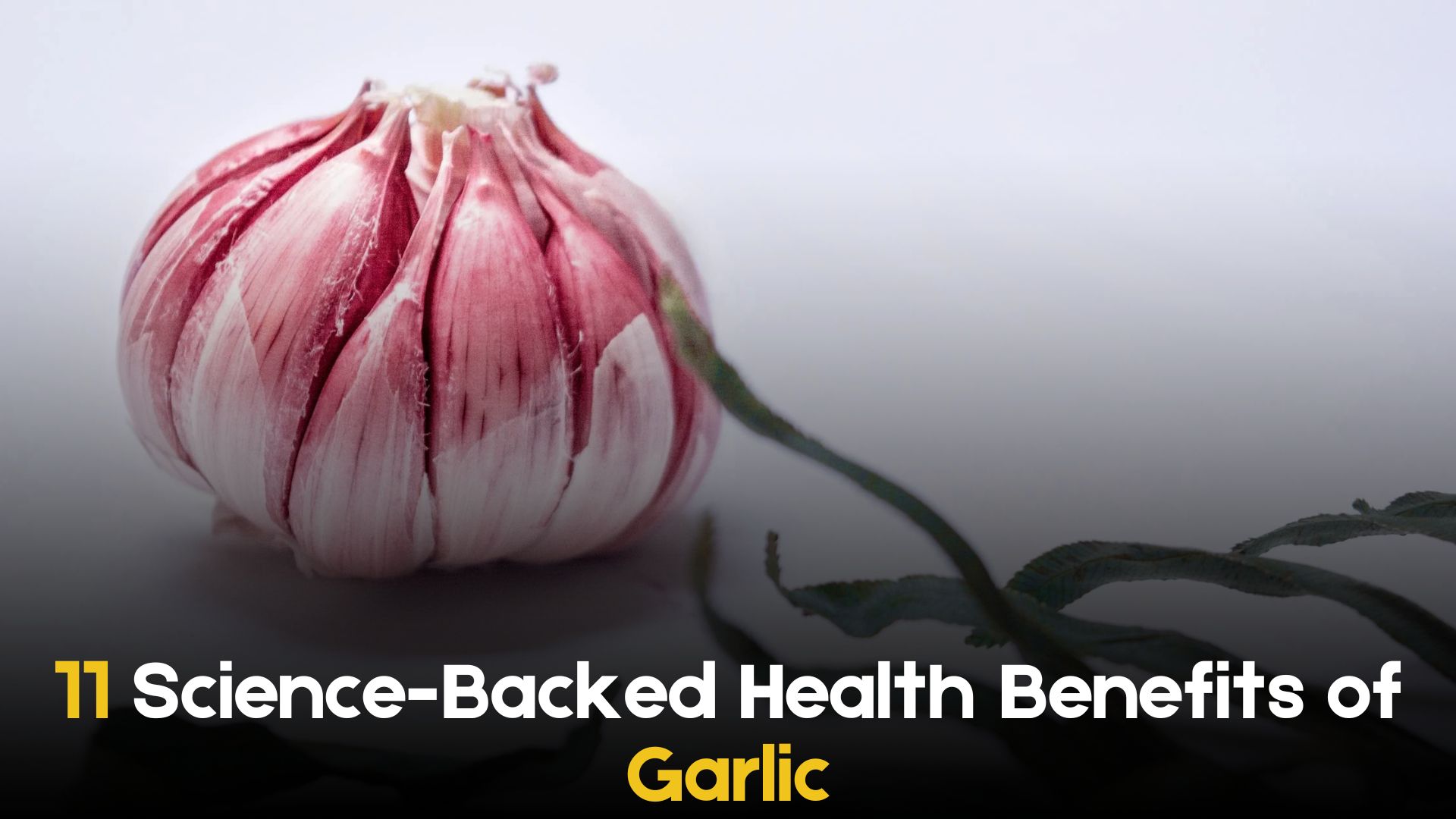Garlic, known for its strong aroma and flavorful presence in various dishes, has been valued for centuries for its medicinal properties. Scientific studies now support many of its health benefits, including its role in boosting immunity, reducing blood pressure, and improving cholesterol levels.
1. Garlic’s Potent Medicinal Properties
Garlic belongs to the Allium family, including onions, leeks, and shallots. Each bulb of garlic consists of several segments known as cloves, and when crushed or chopped, garlic produces sulfur compounds. These compounds, such as allicin, are responsible for its distinct smell and some of its medicinal effects.
Although allicin is unstable and breaks down quickly, other sulfur compounds like diallyl disulfide and s-allyl cysteine remain active and can positively affect the body. These compounds are absorbed into the bloodstream and may help protect against various health issues.
2. Low in Calories, High in Nutrients

Despite its small size, garlic is packed with essential nutrients. A single clove contains only about 4.5 calories, making it a low-calorie option to add nutritional value to meals.
Garlic is rich in important vitamins and minerals such as manganese, vitamin B6, vitamin C, and selenium. Additionally, it contains a variety of other nutrients in trace amounts, all of which contribute to its overall health benefits.
3. Strengthens the Immune System
Garlic has been shown to help the body fight off infections and illnesses, including the common cold. Some studies suggest that taking garlic supplements or aged garlic extract (AGE) can boost the immune system and reduce the severity of colds and flu. This is partly due to garlic’s antiviral properties, which may prevent viruses from entering cells or replicating.
As a result, garlic may help prevent illnesses or shorten their duration when they occur.
4. Reduces Blood Pressure
High blood pressure is a leading risk factor for heart attacks, strokes, and other cardiovascular diseases. Research has shown that garlic supplements can lower blood pressure in people with hypertension.
In some studies, the reduction in blood pressure from garlic was comparable to that achieved with standard medications, though garlic had fewer side effects. Garlic’s sulfur compounds may contribute to this effect by relaxing blood vessels, allowing blood to flow more easily and reducing strain on the heart.
5. Lowers Cholesterol Levels
Garlic has also been shown to reduce total cholesterol and LDL (bad) cholesterol levels. People with slightly elevated cholesterol levels may benefit from consuming garlic or taking garlic supplements. A reduction in LDL cholesterol can help lower the risk of developing heart disease.
However, garlic does not seem to have the same effect on HDL (good) cholesterol or triglyceride levels, suggesting that its impact is mainly on harmful cholesterol.
6. Rich in Antioxidants

Garlic contains powerful antioxidants that help protect the body from oxidative damage, which contributes to aging and diseases like Alzheimer’s and dementia. These antioxidants may reduce the risk of cognitive decline by protecting cells from free radical damage.
Some animal studies suggest that garlic’s antioxidant properties can support brain health and slow down age-related decline. While more human research is needed, preliminary findings are promising.
7. Promotes Longevity
Although it’s difficult to measure the direct impact of garlic on lifespan, its ability to reduce risk factors for chronic diseases like heart disease suggests it could contribute to a longer life.
Garlic’s ability to fight infections and support cardiovascular health could enhance overall health and longevity, especially in older adults or those with compromised immune systems.
8. May Enhance Athletic Performance
Garlic was historically used to improve physical performance and reduce fatigue. While there is limited human research, some animal studies indicate that garlic could enhance exercise performance by reducing oxidative stress and muscle damage.
Although human studies have been inconclusive, the potential for garlic to improve oxygen capacity and reduce fatigue during exercise may provide performance benefits.
9. Helps Detoxify Heavy Metals
Garlic’s sulfur compounds have also been shown to help detoxify heavy metals from the body. For example, studies in people exposed to high levels of lead found that garlic supplements significantly reduced lead levels in the bloodstream, as well as symptoms of toxicity such as headaches and high blood pressure.
Garlic’s protective effects were even more effective than some standard medications used to treat heavy metal poisoning.
10. Supports Bone Health

Recent research has suggested that garlic may play a role in supporting bone health, particularly in postmenopausal women. Garlic appears to reduce oxidative stress that can lead to conditions like osteoporosis.
While more research is needed, garlic supplements have shown promise in reducing pain and improving joint health in individuals with osteoarthritis. These findings indicate that garlic could contribute to maintaining strong and healthy bones.
11. Easy to Add to Your Diet
Aside from its health benefits, garlic is a flavorful and versatile ingredient that can be incorporated into almost any savory dish. Whether added to soups, sauces, or dressings, garlic enhances the flavor of food while providing health benefits.
It can be consumed fresh, as an extract, or in supplement form, depending on personal preference and dietary needs.
Final Thoughts
Garlic’s wide range of health benefits, from boosting the immune system to lowering blood pressure and cholesterol, make it a valuable addition to a healthy diet. Its antioxidants and sulfur compounds help protect the body from diseases and support overall health.
Trending:- The Ultimate Guide to the GOLO Diet
Including garlic in your daily meals can be an easy and delicious way to reap these benefits. However, individuals on blood thinners or with certain health conditions should consult with a healthcare provider before significantly increasing their garlic intake.
Garlic also stands out for its versatility in the kitchen. You can easily incorporate it into various dishes, enhancing the flavor and nutritional value of your meals. Whether roasted, minced, or eaten raw, garlic adds a punch to salads, soups, and sauces. Its robust taste makes it a staple in many cuisines worldwide. Beyond just taste, using garlic in your daily cooking is an excellent way to naturally boost your health, making it a simple yet powerful addition to a balanced diet.




1 Comment